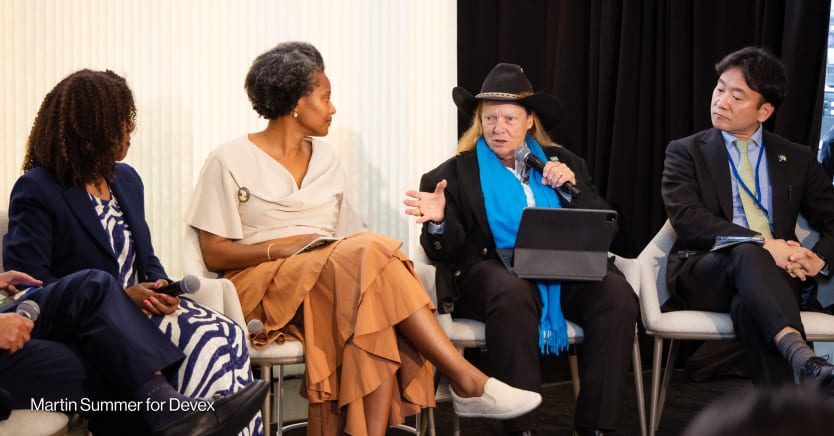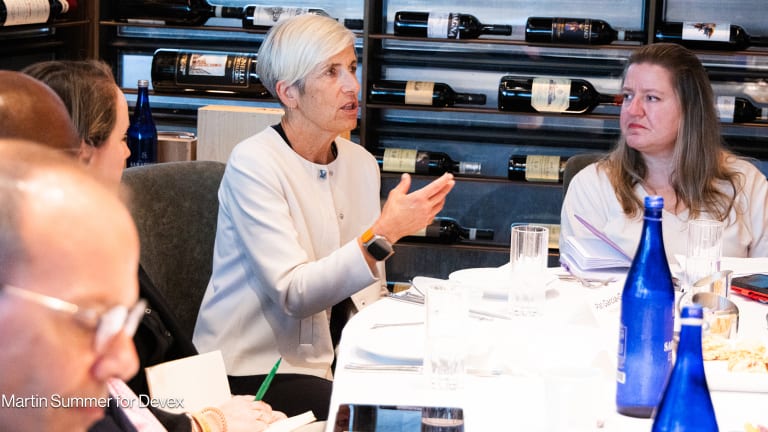
The planet’s warming is accelerating disease burdens and threatening fragile health systems. This was the warning from global health and climate leaders at an event hosted by Devex in partnership with biopharmaceutical company Takeda during Devex Impact House @ UNGA80.
Between 2030 and 2050, climate change could cause an estimated 250,000 additional deaths each year from malnutrition, malaria, diarrhea, and heat stress alone. Yet less than 2% of philanthropic funding worldwide supports climate mitigation efforts.
“In today’s global aid landscape, which is shifting, we’re challenged to do more with less,” Takako Ohyabu, Takeda’s chief global corporate affairs and sustainability officer, said. “But constraints breed creativity, and now is the time to think about cross-sector collaboration very differently.” Ohyabu highlighted the importance of community-rooted solutions and cross-sector collaboration to strengthen health systems in the face of climate change, emphasizing that “climate resilience cannot be built in silos.”
The hourlong discussion spotlighted community-driven approaches and innovative financing to close the “solutions gap” at the intersection of climate and health. Here are the main takeaways.
Concrete solutions from the field
Panelists shared examples of the public and private sectors advancing health-climate solutions.
Mercy Corps CEO Tjada D'Oyen McKenna described the over 200 resilience hubs it has set up in the Caribbean to provide reliable power, clean water, and health services during disasters; Loyce Pace, regional director for the Americas at the International Federation of Red Cross and Red Crescent Societies, talked about IFRC’s work in developing courses on psychological first aid to respond to post-disaster trauma; and Dr. Yosuke Kita, director of the global health strategy division in Japan’s Ministry of Foreign Affairs, outlined vector-control measures and vaccine development to curb dengue and other climate-sensitive diseases.
Additionally, Takeda took the opportunity to announce four projects it would be collectively awarding $32.1 million as part of its philanthropic efforts to advance climate-resilient health systems. These include International Medical Corps’ use of AI-driven tools to improve medicine and supply delivery in Kenya and Somalia; the Society of Critical Care Medicine’s use of solar power and biomedical technician training in core hospitals in Gambia, Liberia, and Sierra Leone; UNOPS Bangladesh’s construction of the country’s first climate-resilient medical-waste system; and Vitamin Angels’ work combating maternal anemia and child stunting in Indonesia through improved nutrition policy, supply-chains, and health worker training.
The need to finance innovation
But to advance more innovative ideas, speakers underscored that fresh ideas must be matched with sustainable funding. In what one attendee called a “dumpster fire,” the global health landscape requires domestic resources, private capital, and philanthropy more than ever, said Kita.
Japan’s partnerships with Gavi, the Vaccine Alliance, The Global Fund to Fight AIDS, Tuberculosis and Malaria, and the Global Health Innovative Technology Fund illustrate how public-private research and development financing can move medicines for climate-related illnesses such as malaria from research to delivery. IFRC has insured its Disaster Response Emergency Fund to guarantee rapid payouts, while Mercy Corps is piloting micro-insurance models that protect East African farmers from drought losses.
Leadership and inclusion are key
Audience voices reinforced the need for locally defined impact metrics, representation of those most affected in solutions, the training of community responders, and investment in leadership development. “Empowering people to implement known solutions in their own way is ultimately the answer,” Hunter Lovins, managing partner at NOW Partners Foundation, said, echoing the audience.
The session closed with a clear call to action: Invest now in inclusive, well-financed solutions before climate-driven health threats overwhelm the global system.
Watch Catalysts for change: Cross-sector solutions for climate-resilient health systems on YouTube.








